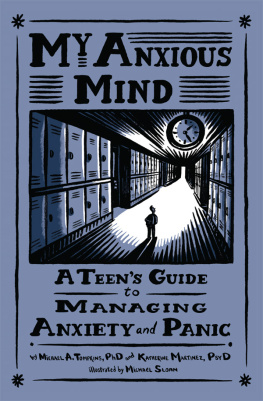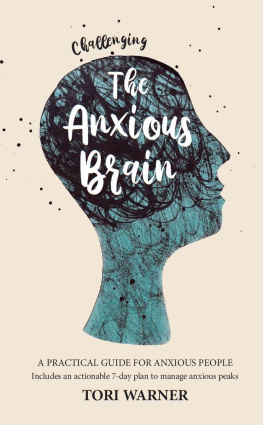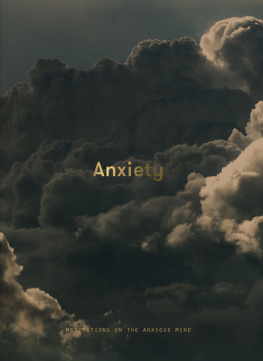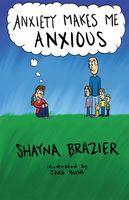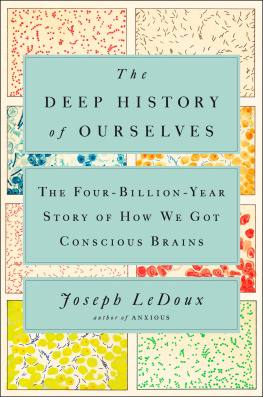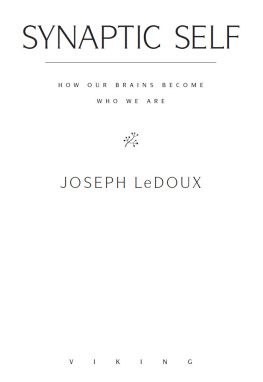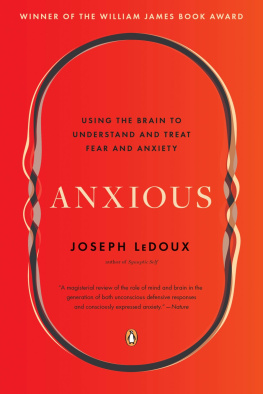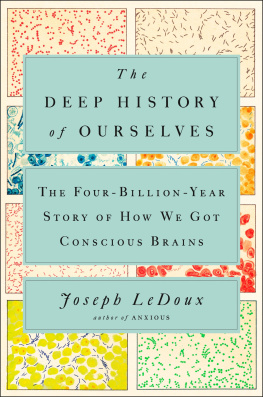Joseph E LeDoux - Anxious: The Modern Mind in the Age of Anxiety
Here you can read online Joseph E LeDoux - Anxious: The Modern Mind in the Age of Anxiety full text of the book (entire story) in english for free. Download pdf and epub, get meaning, cover and reviews about this ebook. year: 2015, publisher: Oneworld Publications, genre: Religion. Description of the work, (preface) as well as reviews are available. Best literature library LitArk.com created for fans of good reading and offers a wide selection of genres:
Romance novel
Science fiction
Adventure
Detective
Science
History
Home and family
Prose
Art
Politics
Computer
Non-fiction
Religion
Business
Children
Humor
Choose a favorite category and find really read worthwhile books. Enjoy immersion in the world of imagination, feel the emotions of the characters or learn something new for yourself, make an fascinating discovery.

- Book:Anxious: The Modern Mind in the Age of Anxiety
- Author:
- Publisher:Oneworld Publications
- Genre:
- Year:2015
- Rating:4 / 5
- Favourites:Add to favourites
- Your mark:
- 80
- 1
- 2
- 3
- 4
- 5
Anxious: The Modern Mind in the Age of Anxiety: summary, description and annotation
We offer to read an annotation, description, summary or preface (depends on what the author of the book "Anxious: The Modern Mind in the Age of Anxiety" wrote himself). If you haven't found the necessary information about the book — write in the comments, we will try to find it.
Anxious: The Modern Mind in the Age of Anxiety — read online for free the complete book (whole text) full work
Below is the text of the book, divided by pages. System saving the place of the last page read, allows you to conveniently read the book "Anxious: The Modern Mind in the Age of Anxiety" online for free, without having to search again every time where you left off. Put a bookmark, and you can go to the page where you finished reading at any time.
Font size:
Interval:
Bookmark:
Praise for Anxious
In this tour de force, LeDoux artfully guides the reader from the unconscious defensive system, through attention and memory, to the conscious experience of fear and anxiety. His traverse from the unconscious to the conscious experience of emotion is rich in scientific detail and yet exquisitely readable. LeDoux completes his masterpiece with provocative discussions of therapies for anxiety. This book is a fascinating revelation of the evolution in LeDouxs own scientific thinking and in the field at large and is a must read for any student of learning, memory or emotion.
Michelle G. Craske, Ph.D., Professor of Psychology and Director, Anxiety Disorders Research Center, UCLA
Anxious is a profound, exciting and immensely useful work about one of our most troublingand puzzlingemotions. Joseph LeDoux takes us behind the scenes of our own minds to show us not only how anxiety is constructed in the brain but how it can be deconstructed. This is neuroscience at its very best: helpful and hopeful without a hint of hyperbole.
Mark Epstein, M.D., author ofThoughts without a ThinkerandThe Trauma of Everyday Life
This marvellous book is science at its best an absolute must read for clinicians and basic scientists as well as for anyone else interested in anxiety and its disorders.
Eric R. Kandel, Senior Investigator, Howard Hughes Medical Institute; author ofIn Search of MemoryandThe Age of Insight; recipient of the 2000 Nobel Prize in Physiology or Medicine
An exquisite and unique attempt to truly relate how neural cells lead to felt conscious states in the human mindthe toughest problem in all of science. LeDoux has thrown down the gauntlet and set the standard.
Michael Gazzaniga, Professor of Psychology, University of California, and author ofTales from Both Sides of the BrainandWhos in Charge? Free Will and the Science of the Brain
LeDoux is a true leader in the field of cutting-edge neuroscience and psychology, yet he also has an uncanny ability to write beautifully and clearly A must-read for anyone interested in the intersection of the mind and brain, and how an understanding of psychology and neuroscience can change ourselves and the world around us!
Kerry J. Ressler, M.D., Ph.D., Professor of Psychiatry and Behavioral Sciences, Emory University; Scientific Council Chair, Anxiety and Depression Association of America
ALSO BY JOSEPH LEDOUX
The Emotional Brain
Synaptic Self
THE MODERN MIND
IN THE AGE OF ANXIETY
Joseph LeDoux

A Oneworld Book
First published in Great Britain and Australia by Oneworld Publications, 2015
This ebook edition published by Oneworld Publications, 2015
Copyright Joseph LeDoux 2015
The moral right of Joseph LeDoux to be identified as the Author of this work has been asserted by him in accordance with the Copyright, Designs, and Patents Act 1988
All rights reserved
Copyright under Berne Convention
A CIP record for this title is available from the British Library
ISBN 978-1-78074-767-5
eISBN 978-1-78074-768-2
Oneworld Publications
10 Bloomsbury Street
London WC1B 3SR
England
Stay up to date with the latest books,
special offers, and exclusive content from
Oneworld with our monthly newsletter
Sign up on our website
www.oneworld-publications.com
To all the researchers who have worked with me over the years and to all my colleagues who have helped move our understanding of fear and anxiety forward
PREFACE
W hen I completed my previous book, Synaptic Self, which was published in 2002, I wasnt certain I wanted to write another book for a general audience. I had gotten the idea that the way to really have an impact on the field was to write a textbook in my particular area, behavioral and cognitive neuroscience. My agents, John Brockman and Katinka Matson, urged me not to, as did my editor at Viking, Rick Kot, each of them warning me that I would regret it as a publishing experience. After struggling with the project for almost a decade, I had to admit that they were correct. I discovered that the textbook format was far too restrictiveit had to be fresh and innovative... so long as it was just like every other competing book. After each chapter was reviewed by a number of teachers from a mix of universities, colleges, and junior colleges around the country, I began to feel little connection to the edited text that was resulting and concluded that my role was more to be a name on the cover than to actually drive the content.
A few years ago I ran into Rick at a reading by our friend Rosanne Cash, who wrote Composed under his editorship, and he asked with a wry smile, Hows that textbook going? Ive been waiting for you to bail out of that and do another book with me. I was thrilled that he was still interested in working with me, and I negotiated, with some help from Eric Rayman, my way out of the textbook and prepared a new proposal for Katinka. Anxious was the result. Rick loved the idea, and so here we are.
Anxious is different from my other books. While The Emotional Brain and Synaptic Self can be thought of as a series of connected essays that hang together around a single theme, in Anxious each successive chapter builds on the previous ones to argue for a new view of emotion, especially the emotions fear and anxiety. Although the book is called Anxious, fear and anxiety are complexly entwined, and must be understood both separately and together.
As an overview, here are the key points that Anxious addresses. First, the science of emotion, and especially the science of fear and anxiety, now finds itself at an impasse, dictated by the way we discuss emotions in relation to the brain. For example, researchers use words like fear to describe the brain mechanisms that cause rats to freeze when in danger, and also to describe the conscious feeling that humans experience if they think that they will be seriously harmed physically or psychologically. The general idea is that a fear circuit in the brain is responsible for the feeling of fear, and when it is activated, whether in a rat or a human, the feeling of fear occurs, along with responses characteristic of fear (such as freezing, facial expressions, changes in body physiology). The feeling of fear is often said to mediate between the threatening event and those responses. Because these circuits are conserved throughout mammals, including humans, we can study human fear by measuring freezing in rats. The key circuits crucially involve the amygdala, which is generally described as the seat of fear in the brain.
In fact, most of what I have just described is wrong. Because my work and writings are in part responsible for these misconceptions, I feel some responsibility to try to straighten out the story before it goes further off track. One of the main goals of this book is to provide a new view of fear and anxiety, one that more accurately distinguishes what we can learn from animals from what we can best learn from humans, and what fear itself really refers to in the context of the human brain.
Dont get me wrong: I am not arguing that we have to study brain mechanisms related to emotions exclusively in humans. There is much we have learned, and can continue to learn, and can, in fact, only learn, from animal research. But we do need a rigorous conceptual framework for understanding what the animal work does and does not mean for understanding the human brain. I offer my view of such a framework, which I think provides a new perspective on fear and anxiety, and the disorders related to these states.
Next pageFont size:
Interval:
Bookmark:
Similar books «Anxious: The Modern Mind in the Age of Anxiety»
Look at similar books to Anxious: The Modern Mind in the Age of Anxiety. We have selected literature similar in name and meaning in the hope of providing readers with more options to find new, interesting, not yet read works.
Discussion, reviews of the book Anxious: The Modern Mind in the Age of Anxiety and just readers' own opinions. Leave your comments, write what you think about the work, its meaning or the main characters. Specify what exactly you liked and what you didn't like, and why you think so.

